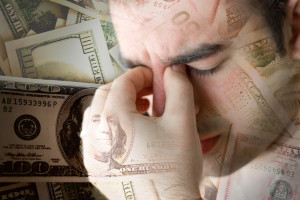I recently read an article coauthored by Jim Clifton, Chairman and CEO of Gallup, and Deepak Chopra, MD, What Triples Your Risk of Being Depressed? It was an intriguing article and one I agree with.
“The Gallup-Healthways Well-Being Index just uncovered that being unemployed, dropping out of the workforce, or working part-time while wanting full-time work are the strongest predictors of having depression. Unemployed adults and those not working as much as they would like to are about twice as likely to be depressed as Americans who are employed full-time.”
What I found fascinating was the Gallup-Healthways Well-Being Index only recently found out the connection between depression and unemployment or underemployment. I want to ask them what took them so long to see what others have known for a long time. But I am grateful that they proved what others have known for many years.
For the past 5 years, I have worked with people who are unemployed or underemployed. I could see how their circumstances made them feel about themselves and their future. I saw their frustration, anger, sadness and fear. It was an inevitable as the sun rising in the morning and setting in the evening.
The article also states: “Clearly our society has a crisis of body and soul – and often both together since depression significantly raises a person’s risk for disease almost across the board… Well-being also declines from a host of things specific to America: chronic stress, uncertainty over keeping a job, anxiety over lost pensions, pressure to increase productivity…”
They are absolutely correct. Some of the risks include but are not limited to high blood pressure, fatigue, lack of concentration, nausea, lowered immunity, weight loss or weight gain, aches and pains, and insomnia. I knew an unemployed job searcher who died of a massive heart attack just about 3 years ago. Two women I know have suffered from severe insomnia due to the stress of their unemployment. Others have gained weight while others have lost weight due to their anxiety.
Clifton and Chopra finish the article with: “The cure for the worst things is a full-time job. Gallup workplace data show that the ultimate job is one in which you get to do what you do best every day, your manager encourages your development, and your opinion counts. When and if every American can have this “therapy” of full-time meaningful employment, then depression, stress, and anxiety will subside…”
While everyone is looking for that ultimate job, many will take a job, any job. One that will pay decently, they can do and relatively close to home. Some people are more choosy, but depending on how long a person has been unemployed, the must haves dwindle.
When the people I saw with their stress showing landed jobs, it was clear that their anxiety was gone. They were happy and relieved, and it showed. Sometimes, I could hardly believe they were the same people I saw earlier. The change was that noticeable. And enjoyable to watch.
What can I do to help you?



I like the cure. The cure for not having a job is to have a job. How do we make this happen ?
Network, network, network. It’s your best bet.
Hi,
This is karthick,thanks for the article.this tells me that i am not alone, and there are people who are also facing this.I studied in a decent college and got placed in a better company, i could realise after working for two years,that i am not doing the job that i like, so i resigned and its been a year and i am clueless what i am going to do. All those physical problems like weight gain, anxiety are already existing.I dint know why i wrote this but it was definitely consoling
thank you
karthick
Karthick, You are not alone. What you are feeling is being experienced by numerous other people in your situation. I wrote this post to let people know they are not alone, and what they are feeling is normal. Wishing you success in your job search.